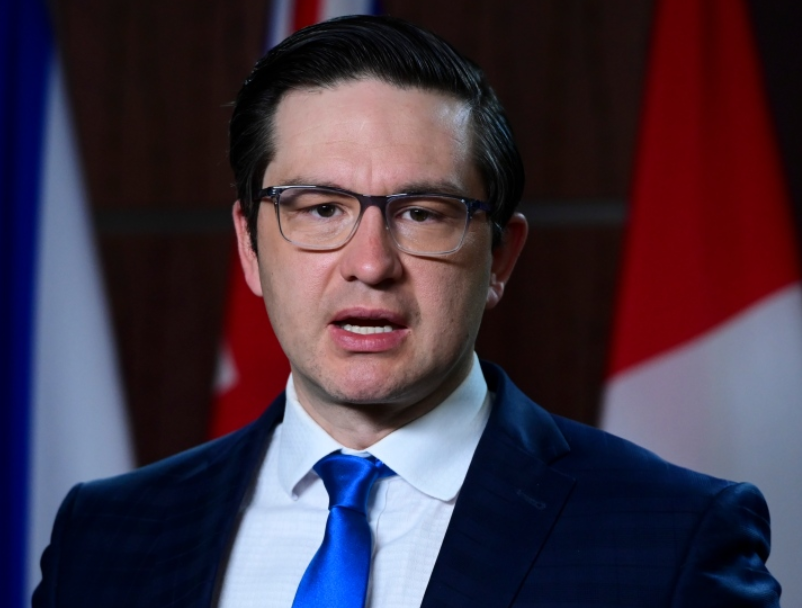Uncovering Pierre Poilievre's Background: Ethnicity & Heritage
Is Pierre Poilievre's background a significant factor in understanding his political stances and appeal? The answer is a nuanced one, as while ethnicity shouldn't define a person, understanding the historical context of identity and belonging can offer valuable insights into the forces shaping his political narrative and the issues he chooses to prioritize.
The question of "Pierre Poilievre's ethnicity" isn't merely a matter of curiosity; it intersects with larger conversations about identity, representation, and the evolving demographics of Canada. While Poilievres focus is on Canadian unity and economic policies, understanding the diverse tapestry of backgrounds within Canadian politics helps us navigate the complexities of political discourse and how it resonates with different segments of the population. It is a complex issue. The concept of ethnicity itself is multifaceted, encompassing shared ancestry, cultural traditions, and often, a sense of belonging. In a multicultural nation like Canada, this becomes especially relevant. This article delves into the details of Poilievres background, offering a balanced view while recognizing the sensitivities that such discussions entail. The goal is not to reduce him to a single label but to understand the elements that contribute to his identity and potentially, his political strategies.
| Attribute | Details |
|---|---|
| Full Name | Pierre Poilievre |
| Date of Birth | June 3, 1979 |
| Place of Birth | Calgary, Alberta, Canada |
| Ethnicity (Ancestry) | Primarily of European descent. Specifically, his heritage includes French and English roots. Further details on more specific ancestral connections are not widely available in the public domain. |
| Education |
|
| Political Party | Conservative Party of Canada (Leader) |
| Political Career Highlights |
|
| Key Political Stances & Policies |
|
| Family | Married to Anaida Poilievre; has two children. |
| Public Profile & Notable Activities |
|
| Reference | Parliament of Canada - Pierre Poilievre |
Delving deeper into the specifics, the term "ethnicity" in the context of Pierre Poilievre leads us to examine his ancestry. While precise details might be limited in public records, what is known points primarily towards European roots. His background includes French and English heritage. In Canada, the interplay between these two dominant cultural influences is particularly significant, as it shapes historical narratives, political discourse, and cultural identities in distinctive ways. The legacy of French and English colonization, the dynamics of bilingualism, and the ongoing negotiation of cultural identities all contribute to the Canadian experience and can shape the political lens through which individuals view the world.
Poilievres upbringing in Calgary, Alberta, provides further context. Alberta, as a province, has its own unique history, political traditions, and demographic makeup. Historically, it has been shaped by waves of European immigration, particularly from Britain, and also by significant contributions from French-Canadian communities. The province's economic development has heavily influenced its political identity, with a strong emphasis on the energy sector and conservative values. Considering this regional context is essential when analysing any politician's background because the environment in which they grow up can significantly influence their perspectives. His formative experiences undoubtedly contributed to shaping his political outlook and priorities, which now shape his views on policy.
It's crucial to differentiate between ancestry and lived experience. While ancestral roots may offer context, they do not fully define a person's identity. Poilievres lived experiences his education, career, and political engagements have played an important role in shaping his values and perspectives. His professional life, his time in university studying international relations, and his extensive experience in Canadian politics have certainly shaped his views. This is why, while knowing his ancestry is interesting, it's vital to understand the complex ways these experiences have impacted his ideology and political approaches. Examining his political positions gives us a more complete view of his approach to policymaking.
The political narrative surrounding Pierre Poilievre is multifaceted, often centering around his economic policies and his communication style. He has consistently advocated for lower taxes, reduced government spending, and policies aimed at supporting small businesses. His focus on affordability and economic growth resonates with a significant segment of the Canadian population. This focus can be seen in his public speeches, policy proposals, and interactions with the media. His critiques of government debt and deficits have positioned him as a voice for fiscal responsibility, and this is a central aspect of his political brand. It is through these ideas that he is connecting with the Canadian populace.
Poilievre's approach to policy also reflects the shifting dynamics of the Conservative Party itself. Over time, the Conservative Party has undergone transformations, and it has adapted to the changing political landscape of Canada. This evolution is reflected in its policies and its outreach to different voter demographics. Poilievres leadership comes at a time when the party is trying to solidify its base while also broadening its appeal to include a wider range of Canadians. His leadership style, therefore, is carefully calibrated to reflect these strategic aims. Poilievre frequently emphasizes themes of individual freedom, personal responsibility, and limited government intervention, which are characteristic of conservative ideology. However, the specific articulation and emphasis of these values are adapted to respond to contemporary social and economic issues.
The role of ethnicity in political strategy is complex. While not always a primary consideration, understanding the diversity of the Canadian electorate is essential for political leaders. Poilievre's team, like those of other political leaders, is mindful of Canada's multicultural makeup. This awareness influences communications strategies, policy development, and community outreach programs. The goal is to create a platform that resonates with a wide range of Canadians, reflecting the countrys multicultural fabric. The success of these strategies can have a big effect on the political landscape of Canada. Poilievre's ability to garner support from various demographic groups will be central to his success.
Another factor is how he uses social media. He is a prominent figure on platforms like Twitter (now X), where he communicates directly with supporters, critics, and the public. This direct communication approach allows him to bypass traditional media gatekeepers and control his message. This is one key part of his strategy. His frequent use of economic terminology and strong rhetoric is characteristic of his online and offline communications. This also impacts how he interacts with people. His communications are meticulously crafted, aiming to appeal to specific demographics and to generate favorable opinions of his policies and his overall political brand.
The debate surrounding Pierre Poilievre's ethnicity is often influenced by the broader discussion of identity politics. This is particularly true in Canada, where discussions about multiculturalism, reconciliation, and the rights of Indigenous peoples are at the forefront. These discussions inevitably touch upon questions of representation, privilege, and historical injustices. His stances on issues related to Indigenous affairs, immigration, and multiculturalism are therefore carefully observed and analyzed. Poilievres public statements and policy proposals are subject to significant scrutiny in the context of Canadas complex social and cultural landscape. His approach to these issues reflects the need to balance competing interests and values. Navigating these issues effectively is vital for any political leader in Canada.
It is also important to address potential misconceptions. One might incorrectly assume that because of certain background, a person is more likely to have specific political views. This is not always the case. Individual values and viewpoints are shaped by a complex interplay of experiences, education, personal relationships, and interactions with the world. It is crucial to avoid making generalizations based on any single aspect of a person's identity. Reducing an individual to their ethnicity or heritage is reductive and overlooks the complexity of their lived experience. It is essential to assess people based on their individual actions, beliefs, and the impacts they have on society.
The impact of Pierre Poilievre's political actions can be evaluated by assessing the outcomes of his policies. This includes evaluating the impact of his proposed policies on the Canadian economy, social programs, and the lives of ordinary Canadians. His emphasis on economic growth, affordability, and individual freedoms are usually core tenets of his platform. His policies on taxation, government spending, and other initiatives are likely to be carefully evaluated in terms of their potential impact. These policies, and their impact on Canadian citizens and their quality of life, will be key factors that decide his success in the political arena.
The question of "Pierre Poilievre's ethnicity," therefore, is not a simple one. It requires us to think carefully about the complexities of identity, history, and political strategy in Canada. Examining his background provides context, but does not fully define him. His political stances, communication style, and the policies he advocates are all shaped by a broad range of factors. His experience with Canadian society is a major part of his makeup. His success or failure as a leader will be determined by his ability to navigate these complexities. This includes meeting the needs of a diverse and changing Canadian society, while also articulating a vision for the future.
In conclusion, understanding the "Pierre Poilievre ethnicity" involves understanding his heritage. It's a component, but not the defining characteristic. It is one aspect of a wider narrative. His life and political positions are influenced by a range of factors. The Canadian political landscape, with its varied cultural influences, is a key part. His journey is a window into the current Canadian landscape and how political leaders adapt to this complex environment. The most important thing to do is look beyond any single aspect, and look at the entirety of his actions and their overall impacts.


